
Home |
Up |
Next |
Prev |


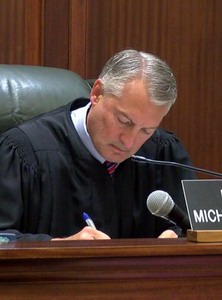

The four faces of the legal system: the police, the lawyers, the judiciary and prison.

Home |
Up |
Next |
Prev |




The four faces of the legal system: the police, the lawyers, the judiciary and prison.
Introduction
Lawyers
Self Representation
The Police
The Judiciary
Jail
Parliament
Solutions
Conclusion
If your understanding of the Legal System came from cop shows and lawyer shows and from what you were taught in school you probably think that police are fair-minded heroes who always try to look at a crime from both sides and will do anything to find the true malefactor, that lawyers are hard-working experts who care about their clients, that magistrates and judges are elite legal experts who welcome the use of facts and allow nothing to get in their way of elucidating the objective truth in each and every case, that the poor will be granted effective legal representation for free and that those who wish to defend themselves in court will be treated equally to qualified barristers and that a defendant shall be deemed innocent unless he can be proven guilty.
I'm sorry to disillusion you if you think that that is the nature of our legal system but the truth is that in most cases in my experience everything above is wrong. Yes there are plenty of cases where SOME of the above are true but very few where ALL of the above are true and as a general rule it is best to assume that NONE of the above will be true to standard which we were taught in school to expect.
If you come from a poor black background you will probably be well aware of the iniquities in the system and your view is much more likely to be that the entire legal system is designed to keep black males in jail and to keep blacks away from nice areas. The question of how blacks are treated by the law is too complex to be dealt with here but certainly there are a great many documented cases where they have been mistreated by the law, some of which resulted in their deaths.
This is horrific enough but it is not only the poor blacks that get a raw deal before the law: Even a well-educated, middle-aged, white man such as myself can find himself on the wrong end of our iniquitous legal system. In this piece I intend to reveal just how rotten our oft-lauded legal system really is. Bear in mind that I am only one person with a relatively minor grievance. There are many thousands of Australians with stories far worse than mine whose lives have been ruined by unjust treatment at various points of the legal process.
A few years ago I had an altercation with a bouncer in a night club and was charged by the police. I believed myself innocent of the charges and set about finding a lawyer to defend me. After going through 3 unsatisfactory lawyers, I decided to defend myself and after a year of effort and study I finally gathered the necessary evidence to demonstrate that I had not broken the law. To my surprise in a pretrial conference the magistrate summarily dismissed my leading argument, ruled my evidence inadmissible and refused to clarify what I could do in court. The police prosecutor refused to cooperate with me with respect to my evidence and took, in my view, an unreasonable view of the point about which the entire case rested. The magistrate, in my view, always sided with the police and I thus formed the strong opinion that I would not be granted a fair trial.
I felt that I was effectively being forced to plead guilty to a charge of which I considered myself innocent and wondered how this could be so. It was explained to me that the Magistrate's Court was a police court and that it was all set up for defendants to plead guilty as trials were too long and expensive. Any illusion I had that Australia had a fair justice system suddenly vanished.
I found a better quality lawyer at this point who undertook to handle my guilty plea. The process was slow but with a well credentialed barrister in my corner, a nice new suit and a fistful of quality references I was given a bond. I will not name any names or provide any specific details but I can assure you that a huge amount of work was wasted by the police and myself in this matter, all for the sake of a simple bond for charge of which I was innocent. What a farce!
I experienced a good chunk of what I perceive to be the mess that is the Australian legal system. Here is my look at the current state of that system. It is by no means comprehensive as our legal system in its entirety is a massive beast with many faces, nonetheless it contains enough material to convince anyone who's eyes are open that our legal system is broken.
Disclaimer - Please bear in mind that any controversial statements or conclusions that I might present in the course of this article are my views or opinions NOT objective facts and should NOT be construed as such. For example when I say that the Australian legal system is broken or that the said legal system may be likened unto the mafia those are simply my views and should be treated as no more than that.
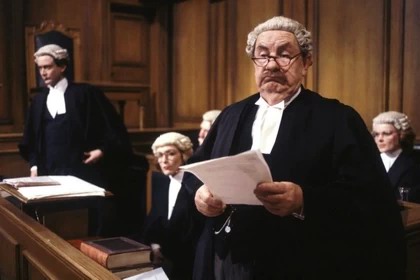
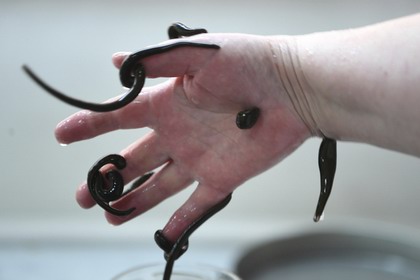
Popular media portrays lawyers as lovable, expert and caring. The reality is somewhat different.
We all know that lawyers are EXPENSIVE! And yes, beyond doubt, they are! In Australia you will not find a lawyer for less than $400 per hour. This price is essentially unaffordable for most Australians. Thus it is that only the rich can use lawyers in the way that is intended. Consider a criminal trial: Each full day of trial will cost you around $5,000 just for your barrister. If a trial goes for 5 days that's $25,000 which doesn't include all the extensive preparation time, court costs and ancillary costs. You can easily rack up $40,000 in more in a defence of a fairly minor charge. In the case of major charge such as murder where the trial might use 20 days or more of court time you might well have to sell your house to pay your legal fees even if you are innocent.
Only the rich can afford such costs which is why the rich normally get off. This is not justice! This is not equitable! This is not workable! This is BROKEN! Without affordable lawyers the entire legal system cannot work in the way it was intended. Instead it is replaced by police courts and a staged conveyer belt system, handing out pre-packaged verdicts and sentences, eventually leading to jail for those that keep being charged.
"But there is Legal Aid!" I hear you cry. "And there are also court lawyers who will act for you free of charge." Both of these are Furphys as I will explain. There is no real way out for the poor who are thus forced to plead guilty.
Court lawyers are real and you can certainly use them for free but they will not undertake any real work in your defence and they will not defend you in a trial. They will do a basic guilty plea for you and perform some basic court duties but little else.
In theory "Legal Aid" exists, whereby the poor can use normal lawyers at the taxpayers' expense but there are numerous conditions which make it unworkable for most people:
All in all "Legal Aid" is not a real solution for the great majority of people. How could it be? The government has no intention of funding a legal smorgasbord for all the underprivileged across the nation. It is little more than a blindfold that the government, the police, the judiciary and the lawyers use to pull over the eyes of ordinary Australians every time they wish to trot out the fantasy of a "Just" Australian legal system.
Since you are paying $400 per hour, (carved up into 6 minute increments), you should be, IMO, entitled to expect that your lawyer would be a legal genius, with a forensic knowledge of the relevant legislation, a head full of the relevant case law, a thorough understanding of and a good working relationship with the relevant members of the police and judiciary and last but not least, a professional attitude: a helpful and understanding demeanour, a fierce determination to execute your instructions to the best of their ability and a willingness to return your calls as soon as convenient.
It is possible that somewhere in this country the perfect lawyer exists who will give you all of the above but I haven't met him and if he exists I would guess that he is very expensive indeed. I don't claim to be a leading expert on lawyers but I have had cause over the years to consult at least 10 different lawyers on a range of matters and in my opinion you generally do NOT get what you pay for:
All in all, in my experience, most lawyers do NOT exhibit the qualities that they are expected to. They are not as expert, as motivated or as helpful as we are led to expect and they CERTAINLY are not worth $400 per hour! In most cases they are just glorified clerks: filling in forms, ticking boxes and negotiating run-of-the-mill standard deals with the authorities. As such they are worth about $60 per hour at best.
The worst of the 4 lawyers I engaged in my case with the bouncers was SO bad that I raised an official complaint against him with the relevant lawyers oversight commissioner. In particular I noted that:
It took 12 months but EVENTUALLY I received the Commissioner's determination. Surprise! Surprise! The Commissioner could find no fault with the lawyer's conduct and, indeed, he dismissed my complaint on the grounds that it was "frivolous"! He said that the level of communication from the lawyer did NOT "fall short of the standard of competence and diligence a member of the public is entitled to expect". Oh really? So the law association's own minimum standard is incompetence and laziness?
Furthermore, he evaded the question of whether the lawyer had been negligent with regard to the law on the grounds that he had no jurisdiction in such matters. Pffft! What is he doing there then? Clearly this means that law association do not care whether its members are negligent. In fact, it implies that they do not want to investigate such matters because they KNOW that their members are often negligent!
Yes people. Yet another illustration that the whole system is rigged. It's run by lawyers for lawyers and the idea that one lawyer will hold another to account is pure fantasy. Essentially they can do whatever they like and unless they are caught embezzling money they will never be held to account.
If Australia is to REALLY offer a legal system with "Justice For All" then lawyers MUST be affordable, competent and helpful. In my experience they are generally NOT!

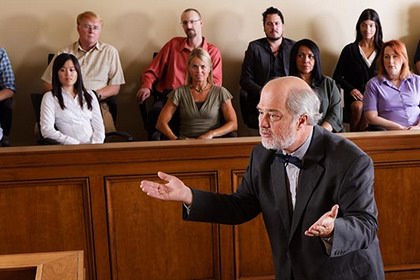
Self representation remains your right but it is not as simple or fair as it should be.
If you can't afford a lawyer or have no confidence in the lawyers that you have tried, then you have no option but to represent yourself! This is not necessarily a bad thing. No lawyer will have the motivation to represent you like you will! No lawyer will follow your instructions as closely as you will! And no lawyer, (unless you are very rich), will have the time to devote to your case that you will!
In theory, in a court of law you have the right to defend yourself! In theory you can run your own legal program, call witnesses, subpoena evidence, cross examine, sum up and essentially do everything your over-priced lawyer can do... In theory.
In theory the judicial officer presiding will assist you with legal procedure and will listen to your evidence and argument with the same weight and openness that she would apply to your opponent. In theory officers of the court and the constabulary will treat your requests for legal articles in the same way they do for qualified lawyers... In theory.
Sadly folks, based on my own experience attempting this and the words of a variety of lawyers on the subject: The truth is that you will generally NOT be treated equally to a credentialed lawyer and you will generally NOT get a truly fair go. You CAN do it but you will be at a significant disadvantage, (as I will explain), and unless the evidence is overwhelmingly in your favour you will be probably lose. Even if you just want to plead guilty you are probably better off using a lawyer as the court will probably give you significant brownie points for doing so, even though you might say the same things and present the same references and mitigation as your lawyer.
I should also point out at this point that self representation, even in an ideal world, is a tricky job. It is not for everyone. If you failed high school it is probably beyond you. You need to have a logical mind, a determination to educate yourself on the relevant laws and regulations and a willingness to follow procedure. If you are of below average intelligence, (as most criminals are), you will probably make significant mistakes in procedure, mess up your cross examination, deliver a poorly constructed legal defence, annoy the court and achieve a poor result. Presumably this is a big part of why courts do NOT like people defending themselves.
HOWEVER, if you are intelligent, motivated and resourceful it is certainly NOT impossible to run a better defence that most lawyers, at least in theory. Lawyers, Prosecutors, Court Officials, Magistrates & Judges are not geniuses, they are simply trained people doing a job. If you are intelligent you can read acts of parliament and case law the same as them, you can deal with evidence the same as them and you can construct a legal argument as well as them provided you have a logical mind.
If you are going to run a legal defence you need access to all the evidence and the apparatus of the court. If you have told the court that you are representing yourself in the matter you are entitled to all of this much the same as your lawyer would be if you had one. This includes inter alia the right to subpoena evidence and the right to discuss evidence and make a deal with the prosecution.
To be fair I found that I was able to do MOST of this and there was no point where the court or the police point-blank refused to cooperate, however I did feel at various times that a lawyer would have been given a smoother ride and would have had a more powerful bargaining position.
Twice I approached the court asking to subpoena evidence and twice the request was not quite granted but was passed on to the police. To be fair the police DID eventually obtain the evidence I sought and it was made available to me but perhaps if I were a lawyer the subpoena would simply have been granted...
I had numerous communications with the varying police prosecutors during the course of my matter and again, to be fair, they DID provide me with ALL of their evidence, however they were not generally interested in hearing my side of the story, not interested for the most part in discussing legal argument and certainly not interested in making a deal. I did NOT feel at any point that they were interested in taking a balanced view of the matter but rather that they had decided that it was their job to prosecute me as hard as they could regardless of whether I was guilty or innocent.
How your are treated in court depends entirely on the judicial officer presiding, (magistrate or judge). You may be lucky and get someone who will give you a fair go or you may be unlucky and get someone who will not.
In my case, in a pretrial conference, the magistrate ridiculed my perfectly reasonable opening argument, gave me an unreasonable, highly theoretical lecture to rule out another solid argument, refused to allow certain of my important evidence unless the prosecution agreed to admit it, agreed with everything the Prosecutor said, refused to inform me as to whether I would be allowed to cross-examine my accusers and told me that if I had any questions about legal procedure to address them to the police prosecutor. When I told her that I did not trust the police prosecutor she was mystified and told me that she was sorry to hear it as there was no reason for me not to trust them... Really? So I should trust people who refuse to listen to my side of the story, refuse to admit my perfectly sound evidence and who are trying to send me to jail for a minor crime that I am innocent of? What planet is she living on?
It was, (and is), my opinion that this was an extremely one sided treatment and I thus formed the strong belief that I would not be treated fairly in court. I already knew that some of my evidence would be ruled inadmissible and I thought it likely that much of the rest would be similarly disallowed. She had already pooh-poohed two quite, (in my view), reasonable legal arguments and I had no confidence that she would agree with any others that I might produce. I also thought it likely that the Magistrate would not allow me to cross examine my accusers and I also formed the opinion from her demeanour that she had already decided that I was guilty.
Without the right to present evidence and cross examine with what I felt to be a hostile magistrate in the chair I saw no way to win. After 6 months of forensic research and finally laying down a solid legal defence I was devastated! I spoke to a lawyer about it who told me that that was the way the system worked. He said that they work hand in hand with the police and they want you to plead guilty. Treating me harshly was a ploy to force me into a guilty plea.
What could I do? I had no power to force the court to be fair and I didn't have the patience, financial resources and mental calmness to put up with a distressing losing trial followed by an appeal or two that might or might not clear my name. I am not George Pell! I engaged a respected lawyer and instructed him to plead guilty on my behalf.
So it is that I did not, in the end, represent myself in a trial. I couldn't trust myself to accept numerous unfair restrictions in the court room and was worried that not only would I lose but that I would tell the magistrate what I thought of such proceedings which would surely make my sentence far worse.
I had been prepared to go to trial and I had read up on the relevant legislation and the rules of evidence amongst other things. I also had lines of questioning for each of the witnesses and legal points that I wanted to reach for each of them. I even engaged a private investigator. It was a lot of work but I was ready for it. I felt the prosecution's case was very shaky and before an objective judge I was confident of having the charges against me dismissed. Sadly it was not to be.
IF you are an intelligent, resourceful person with a logical mind, a willingness to study and a solid work ethic and IF your magistrate or judge has demonstrated that they will treat you the same as the prosecutor and IF you have verified that your evidence will be admitted and IF you have verified that you will have the right to cross examine all hostile witnesses and IF you have reason to believe that the magistrate or judge will be persuaded by legal argument and IF you have reason to believe that your defence is legally sound... THEN you should feel free to represent yourself. If you have all that then you should win.
If any of the above qualifications are not met then unless you are a masochist who likes being railroaded by authority I would not recommend self representation unless the charge is very serious.
If you are up on a murder charge and you can't find a good lawyer then self representation might be sensible. If you're going to lose you might as well do it your own way right? At least you will be able to structure your defence as you wish even if you are stymied by unjust forces every step of the way.
Sadly, I have been convinced from all sides that it is not generally a reasonable proposition to defend yourself in court. Officially, the legal system assures us that it is our right and we will receive a fair go if that is what we wish to do. Unofficially, the system hates people doing it and will do everything it can to stop them.
To understand why this is so we need to look at the entire system as a very large and very successful organism. Each part of the organism does its own job and the various pieces fit together perfectly. Politicians invent crimes, crimes feed the police, the police feed the courts, the courts feed the prisons and the lawyers are fed at every stage of the process.
Each part is dependant on the other parts to sustain itself so it is natural that each part should defend the other parts. This is contrary to the doctrine of the "Separation Of Powers" but as you should be able to see: that doctrine is a legal fiction.
Since lawyers are fed at every stage of the process they are a protected species. Practical self representation threatens the lawyers' food supply so all the other parts of the legal system step in to prevent it. Even the politicians, who pass laws making it impractical to represent oneself.
Remember: with the exception of the police, ALL the other parts of the machine are dominated by LAWYERS. Magistrates and judges are lawyers and most politicians are lawyers. Lawyers are the essential workers in the organisation that you can think of as the "Legal Mafia". They support each other and repel threats from outside so that they can continue enjoying their privileged position and their ill-gotten gains.
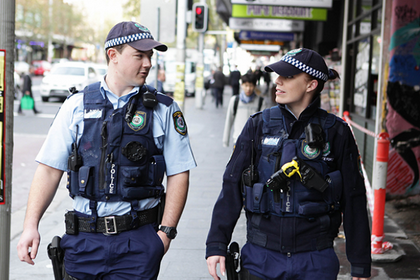
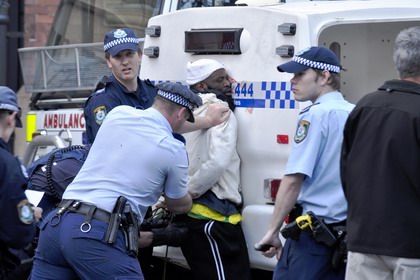
Police generally seem nice enough... until you're on the receiving end...
Police, like magistrates and lawyers are highly variable. Generally though, in my experience, they can be expected to be professional and if you do whatever they ask they will USUALLY treat you according to the book. I have also experienced police behaving badly so people should understand that you can get both good and bad.
Police prosecutors are generally NOT lawyers, they are POLICE with some legal training. They are in court everyday putting the screws to anyone their associates have charged and they know the standard court procedure and the standard sentences for standard crimes. They know the rules that they need to follow and they know how to keep the magistrate happy. Don't underestimate them: they may not be too bright but they are determined and meticulous and they are smart enough to put you away if you don't defend yourself.
In theory police prosecutors are NOT supposed to be one sided. In theory they are supposed to view and present the evidence fairly. In my experience however they will treat everyone they prosecute as guilty regardless of whether there is any doubt in the matter. Perhaps they have been watching too many American police shows...
Also in theory, police in the field should only charge people that they have compelling evidence against. Clearly this is not generally followed as there are numerous cases of innocent people being charged and the charges being later dropped or the judge dismissing the charges. Police may charge people who might be innocent for a variety of reasons:
In order for police to achieve a doubtful conviction they have been known to fabricate evidence. Defendants have been complaining of being "framed" since police were invented. You might think that such activities are rare but I have personally experienced it so I know that it is not rare. I have also experienced police demonstrating meticulous professionalism and gathering real evidence through legitimate means so I know that it all depends on the police in question and the culture of the station they are working from.
In my case I have no beef against the police who arrested and charged me after my altercation with the bouncer as they were simply following up a request from the venue, were reasonably polite and professional and had not yet had the time to gather all the evidence.
I do however take issue against the various police prosecutors who, even after seeing all the evidence and reading my legal defence refused to admit any of the glaring holes in their case, refused to admit my legitimate evidence and refused to countenance any deal with me.
I also take issue with the numerous police who are too busy or lazy to do their jobs. Unless you have a complaint that it suits them to investigate do not be surprised if the police refuse to look into your problem. They know that it is their job so they will always have an excuse ready. Beware! These excuses are probably not valid but they do the job of getting rid of pesky members of the public who want to give them something to do. This does not mean that all the police who fob you off are lazy; some of them will be genuinely busy and simply don't have the time to deal with your issue. However! I think if that is the case the officer should tell you so and find you someone who can deal with it in the near future. It is their job after all!
In my case, after being sentenced I asked the police to charge the bouncers who had assaulted me, which they could easily have done as their crimes were caught on camera. In a fair system they would have investigated those thugs with the same enthusiasm they brought to bear when investigating me. What they actually did was to refuse to even take a statement of complaint from me on the basis that they couldn't investigate people who were involved in the charges against me, charges that a magistrate had judged I was guilty of.
I thought this was a spurious story and I consulted my well-credentialed lawyer who assured me that there was no legal basis for their excuse and that there was nothing to stop the police from charging the bouncers. I told the police that my lawyer had dismissed their excuse but they showed no interest. They stuck to their invalid excuse like a dying man. After all what could I do about it?
Well there was the Ombudsman, who claimed that he could investigate issues with the police if they were administrative in origin. Surely a refusal to investigate a crime was an administrative decision, so I lodged a complaint. The Ombudsman quickly rang me to tell me that they couldn't investigate the matter and suggested that I try ICAC. I explained that laziness was not corruption and that the matter was administrative but they weren't interested. Clearly they were fobbing me off as well.
Then there is the last resort of a local Member of Parliament. But really, what hope have you got of them doing anything? They will fob you off quicker than anyone! The fact is that NO ONE wants to hassle the police whether it is their job or not.
So, ultimately, for most intents and purposes, the police are a law unto themselves. Unless they are guilty of corruption and the evidence is very strong there is nothing you can do to compel them to do anything. This is not SUPPOSED to be the way they work but in my experience it is!
One right we DO have in Australia is the right to remain silent. But should you take that right or should you go ahead and tell the police everything you know? Well this depends on whether you are the defendant, or on the defendant's side, or not.
If you are the aggrieved party you need to make a statement to the police or nothing will be done. Likewise if you are a witness for the prosecution you will need to talk to the police or they won't be able to use your evidence and the prosecution case may be damaged as a result. You may wish to consult a lawyer first but the end result is that you will need to make a statement. You might as well go ahead. You probably don't stand to lose anything, just make sure you don't admit to any breach of the law...
If you are the defendant or likely to be the defendant or on the side of the defendant the situation is entirely different. When the cops say "Anything you say may be used against you in a court of law." they are NOT joking. Once you have said it you can't take it back and it could well result in you or your friend being found guilty.
Most lawyers will advise you NEVER to speak to the police and IMO they are mostly correct in this advice. Here are some reasons why:
It should be clear from the above that in general it is a bad idea as a defendant or defendant's witness to give a statement to the police. There is at least one reason however why you MIGHT wish to do so: If you believe that you are innocent and you want the police to believe you then you probably need to convince them before being charged or immediately after. You will lose all the advantages listed above but if you want the cops to drop the charges early it's probably your only way. The longer you leave it after this point the less likely the cops are to believe you. Mind you, with a strong case and a good lawyer you can possibly get the charges dropped later... Possibly...
However, telling your story at the time of your arrest MIGHT make the police believe you but it's a very risky strategy as you are CERTAIN to lose something and far from certain of gaining anything.
To sum up: If you want to defend yourself or your friend, or even if you just want to plead guilty, you need to present a plausible, consistent face to the court that fits both the evidence and the legal defence. You can best do this by NEVER making a statement to the police but by waiting until you have their story and argument and then tailoring your defence and story accordingly, keeping in mind how the court is likely to view it.
If you haven't figured out by now that justice is a game then you are rather slow on the uptake. Yes it's a game. The lawyers and the cops play it every day. THEY know how to play! Don't be a fool. If you want to win then YOU had better learn how to play!
If you have been mistreated by the police or have any complaint about them, in theory you have an avenue through which your complaints may be heard and acted upon: You can lodge a complaint with your state's ICAC (Independent Commission Against Corruption). Sounds good huh? "Independent"! Well guess what: Your complaint will be passed on to the police's Internal Investigation unit and they will "investigate" their mates. What chance do you think you have of the police viewing your complaint fairly? Well, unless you have a video out in mainstream media of police accepting money, the answer is NONE!
I tried lodging a complaint with ICAC in order to get the police to charge the men that assaulted me and EVEN THOUGH I had clear video and photographic evidence showing these men breaking the law the internal investigation unit were not interested in looking at it and again refused to take my statement. I knew that my complaint would be dismissed without proper consideration but I just wanted to prove it.
Clearly ICAC and internal investigation units are a farce! But this is no surprise. Even people with half a brain know that it's absurd to expect organisations to investigate themselves! Of course the police will back the police 100% of the time unless they have clear evidence against them that is already out in the public media.
So why bother with ICAC if it is a farce? Well again, it is there to pull the wool over the eyes of the gullible populace. It is a disingenuous gesture on the part of the politicians to PRETEND that they want to do something about police misconduct. In fact they have no intention of doing anything of the sort! THEY are part of the system and THEY are part of the problem! They protect the system that they do so well out of.
So if you have been mistreated by the police, or believe they aren't doing their job, give up! They are a law unto themselves and unless you capture them on camera killing someone and get it broadcast there is NOTHING you can do about it!
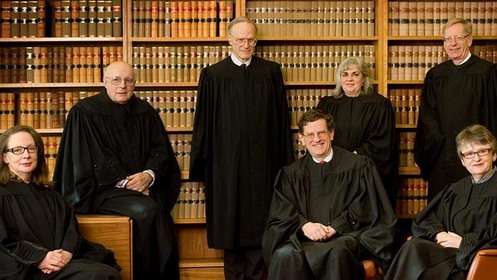

Are the judiciary learned and disinterested as the Australian High Court seem to be here or biased and depraved like this extreme caricature from Gerald Scarfe?
For low end crimes it is the magistrate who determines one's guilt and it is the magistrate who hands down one's sentence. He is the lord and master of his court room and beware anyone who incurs his wrath! In theory, court judgements are a largely objective business whereby the learned man applies a lifetime of judicial practice and experience, case study, and a forensic knowledge of the relevant legislative instruments to arrive at a verdict and sentence that is "just" and consistent with the law. In theory...
In practice the magistrate is extremely busy with various conflicting demands upon his time and pressures from various quarters to achieve various results. Time is generally of the essence and there is simply not the time to allow all disputed cases to go to trial. Something has to be done and that something is to put pressure on people to plead guilty. Sentence discounts for guilty pleas vary across the various courts of Australia but discounts of 20% to 40% are common. There are also the very great cost and stress pressures on defendants and finally there may be the extra inducement of harsh treatment by the magistrate at the pretrial conference to dissuade all but the most determined. Unless you are facing a substantial jail term or feel that you simply can't lose, at some point you will probably decide that the game isn't worth the candle and roll over. It isn't justice but it is affordable to the state...
Guilty pleas submitted after such inducements are termed "convenience pleas" which the judiciary claim officially do not exist. Officially they strongly recommend that you go to trial if you believe yourself to be innocent but this is clearly a legal fiction. Why else would they offer official discounts in the first place? Everyone knows this and the entire criminal defence industry is built on it. Most small-time criminal lawyers spend so much of their time on guilty pleas that they struggle to put up a compelling trial defence since it is so rarely required. Interestingly, the requirement to force all but the most determined to plead guilty is a perfect justification in the eyes of the judiciary and government for keeping lawyer's fees so absurdly high. Once more we see the system supporting lawyers!
But it is not only the pressure of time that can cause a magistrate to hand out injustice, there is also the fact that they are not the superhuman deities that they are painted as, they are ordinary humans like the rest of us with flaws, egos, emotions and short-comings.
As is the case for lawyers, magistrates exhibit variable competence in matters of the law. Officially you will be told that all magistrates display the highest standard of expertise but the reality is that they are all ex lawyers and they don't necessarily know any more than they did when they were lawyers. Now it may be that some of them were very fine lawyers with a high level of legal expertise but not all. As is the case in ALL professions, even at the highest level, some are good and some are not.
In my own limited experience I have had grounds to question a magistrate's legal expertise. In reading the "Rules Of Evidence" I found a couple of sections there whereby the magistrate could have allowed my evidence but she either hadn't read them, had forgotten them or didn't care. Similarly in the question of whether I could cross examine my accusers I seems likely to me that she didn't answer because she didn't know.
Then there is the matter of the magistrate's precious ego. This is not true for all magistrates but there are certainly some who are famous for it. When one is lord and master of a court room, with the power to inflict financial damage, stress, personal restrictions or even jail on a defendant it is not surprising that one might feel more important than one really is. Some might even see themselves as a demigod...
If one acquires an inflated view of one's own importance one might tend to overplay the significance of small irritations. A lawyer who doesn't laugh at the magistrate's jokes might find his legitimate requests denied. A defendant who appears in scruffy attire and fails to tug the forelock might receive an increased sentence.
My own case was greatly delayed thanks to COVID 19 but could have been conducted much earlier had the magistrate agreed to myself and my lawyer appearing via video link. There was no compelling reason for her not to allow such an appearance, the court has the facilities and they are used routinely. She simply wanted us below her in her little domain. This little foible ended up costing my quite a bit of money and time...
Many Australians assume that we have the right to "Freedom of Speech" ie the right to say or print what we think without fear of legal action being taken against us. Sadly, Australians have no such right and we can be charged and punished by the law for saying things that certain people don't like. We can be fined and even be sent to jail for it. One such group of people with special rights and tender feelings is the Judiciary!
The Judiciary have a special law protecting them from criticism called "Contempt Of Court". There are essentially 4 forms of this: "Contempt by breach of a court order", "Contempt by publication", "Contempt in the face of court" and "Acts interfering with the course of justice". There are multiple classes of contempt within each of these categories and I shall only be dealing with those that most obviously impinge on a person's right, (unrecognised in Australia), to freedom of speech.
In summary: Australia's laws have a number of provisions under the heading "Contempt Of Court", some of which prevent criticism of them and their institution. I can't think of any other public institution in this country that boasts such a bizarre, archaic, draconian mechanism. They say that it is necessary to maintain the authority of the courts but IMO this argument holds no water as everyone knows that the authority of the courts grows out of the barrel of a police officer's gun. I suggest that the real reason for such provisions is to protect the precious little egos of judges and magistrates and to gift them a rod with which to strike down those who hate them.
Most of these provisions impinge on the notion of "freedom of speech" and should be rewritten in the light of modern standards. The judiciary and the institution should no longer be placed on a pedestal and instead should be treated the same as other public officers and institutions and members of the public should be allowed a little indulgence where they are justifiably aggrieved.
In theory lawyers are answerable to their various professional conduct oversight bodies, but these are run by the lawyers for the lawyers so they are effectively answerable to no one outside their club.
Magistrates and lower court judges in theory are answerable to higher court judges and they in turn are answerable to the High Court Justices who are answerable to no one. From this we can see that magistrates and judges are answerable to no one outside their club. They cannot even be removed from their office except by other judges. The general public has NO way to get rid of a judge whom they find unacceptable. What other public officer enjoys such a privilege?
Since all magistrates and judges are ex lawyers they and the lawyers form a vast legal body politic that wields enormous power and sucks enormous amounts of money from the population that it preys upon. Essentially there is no legal way to stop them.
Is it right that the legal fraternity should be answerable to no one? "Yes!" they shout. It guarantees separation of powers, freedom from corruption and "Justice For All!". What a load of disingenuous fantasy! I have just spent pages demonstrating that there is no justice for all in the current regime, quite the reverse in fact.
Everyone else in society is answerable to someone, usually the Government at the last resort, but NOT the legal fraternity! This must change. Unfortunately it is the legal fraternity that make such changes and there is no way that a leech is going to stop sucking blood of its own accord.
In my view the fact that there are simply not the resources in the system to give everyone a fair trial is the gaping wound in the side of Janus that reveals the festering, rotten flesh inside that is the Australian judicial system. It may have been ever thus but that doesn't excuse it.
One might think that such an appalling mess with so many victims would engender a public movement demanding reform! One might think that, but with the exception of the "Black deaths in custody" marches, it hasn't happened. Perhaps the number of victims is not high enough or perhaps the victims are too depressed to do anything? Perhaps it doesn't occur to the victims that anything can be done and they simply accept the system as a necessary evil? Perhaps the victims simply want to move on and forget their unjust experience at the hands of the courts?
I believe that there are always solutions to societal problems and the legal system is no exception. I will be looking at possible solutions later.
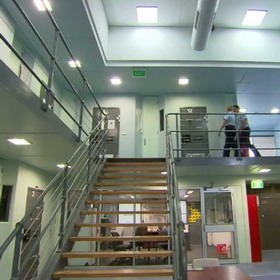
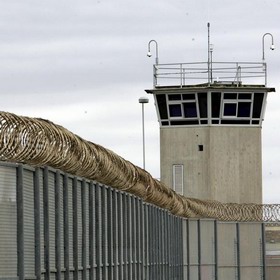

Jail is not a place most people want to go. You can even die there...
I do not know much about Australia's penal system so I will not be talking much about it however I have no doubt that there is a GREAT DEAL that can and should be written about it by those that have been through it.
Jail is the 4th face of the justice system, the last stage and I'm guessing: the most brutal. Yes, I agree that people who actively cause harm to our society should be removed from it. In the absence of the death penalty they must go somewhere and that place is jail. In the absence of a better remedy that is the way it must be, however, we need to ensure that the place is safe and humane. The high rate of deaths in custody for whites and blacks alike is profoundly disturbing and presumably indicates some kind of systemic problem with the system that ought to be fixed.
One thing missing from jails in this country is public oversight. As a member of the general public you can't just walk into a jail and see what is going on, nor can the news media. Only the workers and unfortunate inmates know the score and they are not usually in a position to talk to the media about it.
In the interests of public scrutiny there should be a public video channel run by prisoners where they can show their daily lives and detail their grievances with the jail management. I think it is important for the general public to have a proper idea of what it is subjecting wrong-doers to and also for inmates to receive truly independent oversight from the public.
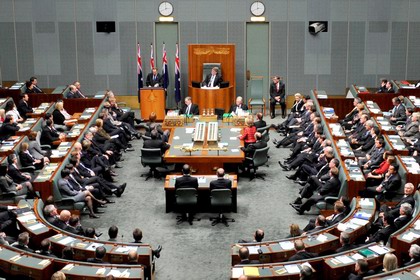

The House of Representatives where laws are made and some of the early laws.
Ultimately the government of Australia is accomplished by a raft of legislative instruments all drawing their power and authority from the people of Australia via the Constitution. The Constitution and all the legislative instruments were drawn up by lawyers and they are interpreted and enforced by lawyers.
This disproportionate allocation of power to one minority group might be a problem enough on its own but unfortunately most successful politicians are also LAWYERS! Clearly this provides massive scope for conflict of interest!
Lets look at a list of recent PMs: Scott Morrison - Economic Geographist, Malcolm Turnbull - Lawyer, Tony Abbott - Lawyer, Julia Gillard - Lawyer, Kevin Rudd - Diplomat/Linguist, John Howard - Lawyer, Paul Keating - Clerk/Unionist, Bob Hawke - Lawyer, Malcolm Fraser - Grazier, Gough Whitlam - Lawyer, Billy - McMahon Lawyer etc.
The Australian parliament is supposed to be representative of ALL Australians. Lawyers should not be represented any more than any other profession and yet we see a HUGE domination of the Houses by that one profession. Where are the doctors, scientists, teachers, nurses, cooks, cleaners, truckies, builders, police, pilots, shop assistants, factory workers etc?
What you see is the Legal Mafia keeping control of the only organ that could possibly threaten it: the Parliament. With lawyers running the country their cosy autocracy can safely thrive and everyone on board can have a tasty slice of the ever increasing pie. Nice!
But how do they do it? How do they ensure that a never ending supply of ambitious lawyers keep winning preselection? A big part of it is that lawyers are fundamentally interested in politics, more so than other professions, since it is the source of their power. The parliament creates the laws that they deal with so it is a natural career path. No other profession can say that other than perhaps the confidence trickster...
At any rate it is an unhealthy situation as it means that there is effectively no oversight over the Legal Mafia.


There's usually a solution to any problem. The trick is to think of it!
The greatest problem with achieving justice in the current system is undoubtedly the cost of lawyers. The adversarial system that we use depends on plentiful quality representation at its very heart. Without that you cannot expect any justice and while they remain overly expensive we don't have it.
Average lawyers are no more skilled that the average teacher and should be paid accordingly. In fact many of them are less skilled than that and should be paid accordingly. Lawyers enjoy their absurd hourly rates because they are part of the strongest union in the land. Despite fact that many fresh law graduates cannot find work you will NOT find any lawyer willing to work for less than the recommended $400 per hour, (unless you find one that is working pro bono). The lawyers who control their profession are so greedy and jealous of their extortionate remuneration that they are more than happy to send their new blood to the wall or out of the profession entirely rather than contemplate charging a fair rate for service. You might think that these young lawyers would rebel and work for half price, but they don't. Now THAT'S the power of the Legal Mafia!
The power of the Law Societies and other such bodies needs to be broken. The government needs to legislate the right of graduates to work for an acceptable fee, say $60 per hour. Once the wall is broken there will be a flood of customers flowing to the cheaper lawyers and a more realistic rate will be achieved for all.
The government should also introduce a legal aid alternative whereby ANYBODY can hire a lawyer for $60 per hour for ANY purpose. Will law graduates work for $60 per hour? Sure, if they can't get work elsewhere. Of course, the Government is RUN by lawyers who represent the Legal Mafia so there is no chance of reform while that remains the case...
When the public can hire an affordable, helpful, expert lawyer at any time for any reason we have a shot at a just legal system. Until that day it must remain a pipe dream.
As I have mentioned, police prosecutors tend to be focused on getting convictions regardless of whether the defendant is guilty or innocent. If government lawyers were employed instead and instructed to be open minded about cases and only prosecute those that are guilty on the evidence then there would be less cases going to court and less innocent people being forced to plead guilty.
Of course the reason that the government chooses to use police prosecutors is because they are CHEAPER than accredited lawyers and much of the reason for the peculiar anomalies in the legal system is about keeping the costs down. But if the government solved the lawyer cost problem they might find that independent prosecutors were CHEAPER than police and all of a sudden the police dogs would be gone.
Police internal investigation is a joke and everyone knows it and ICAC is only for corruption. What is required is a TRULY independent organisation that is empowered by the government to investigate any and all grievances against police. It must have the power to search ALL police records and question ANY police officer at will. It must have the power to charge police and prosecute them. It must also have the power to compel police to investigate matters and charge persons which they otherwise would not do, assuming there is a sound basis for doing so.
In order to establish the true independence of this organisation it should not in general employ ex members of the police. It should nevertheless employ people with expertise in the law and police practice. It also should employ people with some sympathy for those who have been mistreated by police. This doesn't mean that every disaffected police-hater in the country should be given free rein to attack the police on their word alone. Matters should only be proceeded with where there is solid evidence to support investigation and precedence should be given to the more important examples.
The service must, or course, be adequately funded...
One of the biggest reasons that I decided not to go to trial was that my evidence was disallowed. No doubt there was some technical excuse as to why that was but the fact is that technical reasons and twisted legal practice do NOT excuse injustice! Those archaic rules need to be thrown out and let the wind of freedom blow through.
I say: Let ANYTHING that seems relevant be used as evidence. If the magistrate, the judge or the jury don't like it then let THEM decide whether they wish to believe it. If the opposing counsel objects to it let them produce reasons as to why it is not genuine. To object to a properly witnessed statement because that person didn't appear in court for example is an absurd technicality and is not just.
As for evidence being inadmissible because it was gathered illegally: How can a Judge sleep at night knowing that he let a murderer go free because the incontrovertible evidence proving his guilt was illegal due to some administrative oversight? Is that justice? NO! If a person is guilty of obtaining evidence illegally then they should be charged with the offence but to disallow otherwise perfectly sound evidence is cutting off your nose to spite your face!
Removing all but the most patently obvious restrictions on evidence would free up significant legal argument and assist all parties in getting to the truth. Now that would be step in the right direction!
Supposedly all magistrates and judges are expert in matters of the law and basically infallible. Supposedly, and yet: There is an extensive and well utilised appeal mechanism whereby the rulings of these supposedly infallible experts may be overturned. Not only that but such rulings commonly ARE overturned, proving that the "experts" were not expert after all and had, in fact, made mistakes.
Sometimes a determined and well-resourced person might make 2 or 3 successive appeals before the High Court of Australia rules that the lower experts were wrong. There are numerous such cases but the conviction of George Pell was a recent high profile example.
Why should people have any confidence in the competence of the judiciary when they are often proved wrong by their associates higher up the tree? It begs the question: If they are proved wrong in matters of appeal, which are only run by clients with substantial resources, how often are they wrong in matters that are not appealed?
Well, I'm sure that any experienced expert lawyer could tell you confidentially about the numerous examples they find in their everyday practice, but apart from that you can easily infer that there are probably roughly as many mistakes made in judgements that are not appealed compared to those that are in the ratio of poor defendants to rich defendants.
Unfortunately there are FAR too many laws and even experts may have trouble remembering all the relevant passages and factoring them into their decision. Furthermore, although in my opinion legislation is generally well drafted, there nonetheless remains the possibility of a contradiction or uncertainty resulting from an oversight or mistake on the part of the author.
Both of these problems may be resolved through the device of "Judgement By Computer". If you create a computer database of all legislation and run a judgement program written in some logical programming language, (Prolog for example), then you will effect a genuinely complete, repeatable and scrutinizable judgement system! There are various advantages to this method:
People are afraid of computers dictating their lives as we have all seen Terminator, The Matrix and other movies of that ilk, where computers take over the world, exterminating and enslaving humans, however the reality is that in all other areas of our lives we trust computers to handle our intimate affairs, (such as banking, tax, healthcare etc), and they do a much better job of it than human clerks would. A computer judgement system would be no different. Yes there would be teething problems and bugs but these would be gradually worked out and the system would have to reach trusted status before it would be given full rein. Eventually, the judgement system itself could be PROVEN correct. Now that would be something!
Defendants have deplored unjust judgements ever since the legal system began. It was address such concerns that the appeals system was instituted and that has been the only solution to the problem until now. It is not a satisfactory solution however, owing to the cost and the unpredictable nature of judges. NOW however there is a better way! Now there can be "Judgement By Computer"! At last: An incontestably objective, accurate and disinterested judge!
Magistrates want people to plead guilty because there isn't enough court time to go around. Specifically there isn't enough "trial time" to go around. The time allotted for trials is a only a minority of the total court time available, most of which is taken up with procedural and administrative matters, such as adjourning appearances, conducting pre-trial conferences, issuing orders, hearing submissions, sentencing those who have pleaded guilty etc.
If there were more trial time available there would be less pressure on magistrates to encourage defendants to plead guilty. Of course court time costs money as magistrates are well paid and there are quite a raft of supporting players, all of whom need to be paid. Most of this is paid for by the Government in criminal matters and you can be sure that the Government do NOT like paying and will do whatever they can to AVOID paying! Essentially this means that they limit the amount of trial time available and thus the number of trials.
Once again we see that the greatest flaws in our justice system are due to MONEY! Again, the solution is to reduce the cost of trials. We can do this by replacing magistrates with computers and forcing lawyers to enter their arguments and contestable results into the program before the trial. The matter can then be reduced to one or two legal points and only evidence relevant to those points need to be considered.
In fact, once the legal fraternity gain familiarity and expertise with the computer program it may be possible for a substantial number of cases to be resolved by computer without anyone needing to appear in the court room. Now THAT would save a lot of time and money!
As previously mentioned it seems clear to me that there are FAR too many pages of legislation! Before the advent of AustLii you could go into any successful lawyer's office and see an ENTIRE wall covered with books of legislation. That was manifestly excessive, as it was patently impossible for anyone to know it all even then and of course there is more now...
When lawyers and judiciary don't know the relevant legislation thoroughly it is impossible for them to take a correct view of the matter and they will perforce miss things. This is not good for anyone and it is not just. The fewer words of legislation there are the better legal practitioners will be able to do their jobs.
Unfortunately governments tend to measure their success by how many pages of legislation they can pass in their time in power. This is quite insane as the system cannot really cope with it all. I propose that the Constitution be altered to specify a maximum number of words for all the legislation in its jurisdiction. If new laws need to be added old laws must first be repealed or reduced.
Have you ever read legislation? I have read quite a bit and IMO, there are FAR too many clauses. Do we really need so many conditions? Can't we just simplify the hell out of it all? Surely that would be best for everyone?
As previously mentioned: There is a hugely disproportionate number of lawyers in Parliament and most of the top ministry jobs, including the PM, tend to be filled by lawyers. This creates a constant and very grave conflict of interest as it means that Parliament will always protect and foster the interests of the Legal Mafia.
The obvious solution is to limit the number of lawyers permitted in the Houses and also the number permitted in any given ministry. Let's say that no more than 5% of all MPs may have a Bachelor of Laws and no more than 2 of them can be in any given cabinet.
Certainly the Legal Mafia will jump up and down at the erosion of their power and it will not be easy but such a thing must be enforced if we are to ever pull the bloated leech off the body politic and fix the broken legal system.
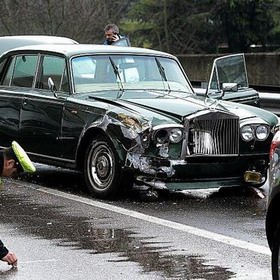
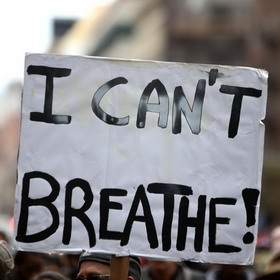

Our legal system is broken folks...
Politicians and lawyers like to assure us that we have a "Rolls-Royce Justice System"... Well IMO the only thing "Rolls-Royce" about it is the price tag! What we have is a monstrous death cart with the bloated bodies of the legal fraternity sitting on top in armchairs drinking champagne while the great spiked wheels of the monstrosity puncture the bodies of the numberless common-folk victims, blotting out their hopes while sucking their money and lives out through giant canulas embedded in the horrific spikes.
I hate to say it because I love Australia but in my view we now live in a nation where:
To be fair our legal system is better than that of many other countries where the rule of law is under the thumb of a dictatorship such as China, Saudi Arabia or Iran or under the control of Islamic Clerics such as Pakistan, Indonesia or Malaysia. Our punishments are relatively light for certain crimes to compared to many other countries and our prisons are relatively more comfortable.
However, just because things are worse in various other places doesn't excuse the injustices in our own system. For people running afoul of a rigged system here being told that at least they're not languishing for years without trial in China is small consolation.
On the positive side there ARE practical measures that we can take to reform the broken system. Unfortunately getting them through will almost require a revolution... Still, if sufficient people cry out: "ENOUGH!" then perhaps we might see real change and MAYBE we might finally get a shot at real "Justice For All!"
Maybe... don't hold your breath.
Meanwhile the terrible death cart rolls...
Warren Mars - February 21, 2021